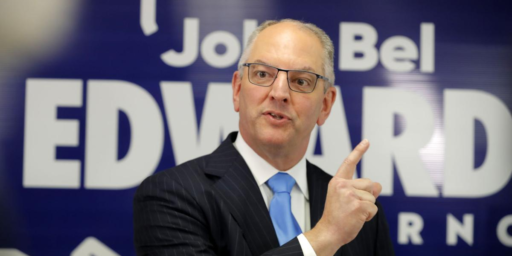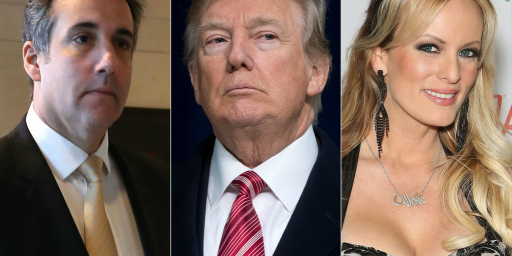John Edwards Wants to Reengage the World
Dan Drezner‘s right: Rudy Giuliani’s bizarre Foreign Affairs essay sucked all the oxygen out of the room, leaving no attention for John Edwards’ piece. I had intended to engage it yesterday but, given how vanishingly unlikely it is that Edwards will get the Democratic nomination, I never got around to it.
Drezner captured my attention, though, with this pithy summary:
[O]ne has to conclude that Edwards’ thinks the word “reengage” actually means “sprinkle magical fairy dust from the House of Gryffindor on the problem, which will cause all parties to recognize their common fate.”
Could it be that bad? After all, presidential candidates love vague platitudes. Those who go into detail tend to be candidates, like Bill Richardson, who know they can’t win. Or, like Rudy Giuliani, would have been better off sticking with the platitudes.
The meaty part of the intro is definitely deep in fairy dust:
Rather than alienating the rest of the world through assertions of infallibility and demands of obedience, as the current administration has done, U.S. foreign policy must be driven by a strategy of reengagement. We must reengage with our history of courage, liberty, and generosity. We must reengage with our tradition of moral leadership on issues ranging from the killings in Darfur to global poverty and climate change. We must reengage with our allies on critical security issues, including terrorism, the Middle East, and nuclear proliferation. With confidence and resolve, we must reengage with those who pose a security threat to us, from Iran to North Korea. And our government must reengage with the American people to restore our nation’s reputation as a moral beacon to the world, tapping into our fundamental hope and optimism and calling on our citizens’ commitment and courage to make this possible. We must lead the world by demonstrating the power of our ideals, not by stoking fear about those who do not share them.
But it’s good red meat for the base and just an intro after all. That’s followed by several paragraphs of complaints about the Bush Administration. Not exactly forward looking but, again, typical for a presidential candidate from the opposition party. That one has to read through two and a half pages to get to what he would do is stretching it a mite, though.
The first one, though, is a doozy:
- “We should begin our reengagement with the world by bringing an end to the Iraq war.”
- “Once we are out of Iraq, the United States must retain sufficient forces in the region to prevent a genocide, a regional spillover of the civil war, or the establishment of an al Qaeda safe haven. We will most likely need to retain quick-reaction forces in Kuwait and a significant naval presence in the Persian Gulf. We will also need some security capabilities in Baghdad, inside the Green Zone, to protect the U.S. embassy and U.S. personnel.”
- “[W]e will need a diplomatic offensive to engage the rest of the world — including Middle Eastern nations and our allies in Europe — in working to secure Iraq’s future.”
- “The United States must make a decisive new commitment to employ the extraordinary assets of the U.S. military — our airlift capabilities, logistical support, and intelligence systems — to assist UN and African Union peacekeeping efforts in Darfur.”
- “Iran cannot be allowed to possess nuclear weapons.”
- “[R]ight now we must do everything we can to isolate Iran’s leader from the moderate forces within the country. We need to contain Iran’s nuclear ambitions through diplomatic measures that will, over time, force Iran to finally understand that the international community will not allow it to possess nuclear weapons.”
- “[W]e must use much more serious economic sanctions to deter Ahmadinejad’s government when it refuses to cooperate. To do this, we will have to deal with Iran directly.”
- “We must engage the North Korean government directly, through the six-party framework, placing economic and political incentives on the table in exchange for the verified, complete elimination of North Korea’s nuclear weapons capabilities.”
- “In working toward the goal of a nuclear-free world, the United States must lead the effort to strengthen the international nonproliferation institutions, not cast them aside.”
- “The Marshall Corps, patterned after the military reserves, will consist of at least 10,000 civilian experts who could be deployed abroad to serve in reconstruction, stabilization, and humanitarian missions.”
- “We will have to continue integrating rising powers into a peaceful international system by convincing them that they can both benefit from and contribute to the system’s strength. This means adapting our most important international leadership organizations, such as the G-8, to include these new major players.”
- “[W]e must stand by our ally and partner Israel, ensuring its security while doing everything in our power to bring peace and stability to the region.”
- “On issues such as trade, climate change, and human rights, our overarching goal must be to get China to commit to the rules that govern the conduct of nations.”
- “Our most important goal is to draw Russia into the Western political mainstream through continued engagement and, when necessary, diplomatic and economic pressure.”
- “[R]eforming the UN so that there is a place for India on the Security Council and working with India to help it achieve a credible and transparent plan to permanently separate its civilian and military nuclear programs.”
- “[M]ilitary professionals will have primary responsibility in matters of tactics and operations, while civilian leaders will have authority over political decisions and in all matters of broad strategy.”
- “I will double the budget for recruitment and raise the standards for the recruitment pool so that we can reduce our reliance on felony waivers and other exceptions.”
- “[C]reate a national security budget that will include all security programs at the Pentagon and the Department of Energy, as well as our homeland security, intelligence, and foreign affairs agencies.”
- “[I]ncrease our funding for global primary education sixfold, with a $3 billion annual effort to educate poor children in countries with a history of violent extremism.”
- “[P]ursue reform of the school systems in developing countries, working to eliminate school fees and required expenses for books and uniforms, which effectively bar millions of children from enrolling; investing in teacher education, classroom expansion, and teaching materials; and helping to provide safe and hygienic facilities for all students.”
- “[G]uaranteeing universal access to preventive drugs and treatment by 2010. I will also substantially increase U.S. funding for clean-water programs. Finally, I will direct U.S. agencies to lead an international effort to dramatically increase preventive care, beginning with increased vaccinations and the provision of sterile equipment and basic medications.”
- “[C]reate a new cabinet-level position to coordinate global development policies across the government. “
Edwards is apparently a firm believer in the Power of Wishful Thinking. The idea that we’re going to put the nuclear genie back in the bottle is perhaps the strongest example of that. Otherwise, though, most of this is standard Democratic Party boilerplate. It’s not as thoughtful as Richardson’s vision but it’s at least less dangerous than Giuliani’s.
Closely on the tail of his dream of a nuclear-free planet is his notion that Iran and North Korea will give up their nuclear programs if we merely demonstrate resolve, talk to them more, and threaten sanctions if they don’t behave. Haven’t we been doing pretty much that for years? Sovereign states are loathe to give up the very thing that makes them more powerful and feared.
The idea that curing poverty and disease across the world is simply a matter of throwing money at the problems or that doing these things will make everyone love us represent the naivety of liberal idealism at its finest. Still, attempting these things is worthwhile in their own right. Of course, we’ve been doing them, on a bipartisan basis, for decades. This isn’t really anything new.
The idea that reshuffling the bureaucracy and consolidating assets will save money and improve performance is longstanding and bipartisan. The logic is impeccable. The touted efficiencies, however, never seem to arrive.
His Marshall Corps, like Giuliani’s variant, is really just Tom Barnett’s SysAdmin by a less wonky name. I’m skeptical that large numbers of civilians are going to sign up to go into war zones but the idea is otherwise a good one.
My main problem with Edwards’ vision, as with Giuliani’s, is that it actually increases our commitment to military interventionism. At least Giuliani wants to do it in a misguided attempt to beat back the Islamists. Edwards seemingly wants to do it Just Because. It’s especially ironic in his case, given that he wants to get American forces out of Iraq — because they’re overstressed, don’t you know — and then send them right into a civil war in Darfur. To paraphrase Drezner, Sweet Jesus, that’s stupid.
Increasing the representation of emerging powers in international institutions like the G-8 and the Security Council is likely inevitable. It opens a serious Pandora’s Box, though, making drawing the line incredibly difficult. The end result, I fear, will be institutions that are even less effective than they are now. Building consensus among five or eight great powers is hard enough; doing it with ten or twelve may prove impossible.
My guess is that, were Edwards to somehow get elected president (presumably, with the help of the House of Gryffindor), he’d change his mind quickly on some of these items. Most notably, he’d probably decide that it makes more sense for the commander in chief to decide operational priorities rather than a military bureaucracy that has its own agenda.




Another variant was also proposed by GWB in his SOTU this year. My complaint about such proposals has been where will be budget come from? Defense? State? Bush’s plan sidesteps this problem somewhat by making it a voluntary plan analogous to the Peace Corps.
I wonder if Sen. Edwards understands that the ability to provide oversight over the use of funds in such countries is generally very low and we’ll have to take special care that the additional funds won’t be used for political consciousness raising (or bomb-building classes) rather than primary education?
“Once we are out of Iraq, the United States must retain sufficient forces in the region to prevent a genocide, a regional spillover of the civil war, or the establishment of an al Qaeda safe haven”
I thought genocide was acceptable?…and why would al Qaeda want to go to Iraq if/when we pull out?…seems to me it would be a dangerous place to operate from.
I find it amusing when presidential candidates who complain about the imperial Bush presidency define the job they are going to do as president in terms that only an emperor could possibly accomplish.
No, no we haven’t.
We have NOT been talking to Iran, and for the first 5 years of the Bush Administration, we were NOT having constructive talks with NK. We have been threatening both nations, not talking. Recently, we have returned to the Clinton policy of engagement and negotiation with NK, which has made measureable progress. Unfortunately, the Norks developed weapons while we were being belligerent, because it was ENTIRELY RATIONAL for them to do so.
Edwards is more Hufflepuff than Gryffindor, methinks. Hillary is Ravenclaw. Obama is a more plausible Gryffindor.
Of course, all the Republicans are Slytherin. I expect we’ll see an essay to that effect in the Weekly Standard one day, along the lines of their defense of the Galactic Empire as opposed to the Rebellion.